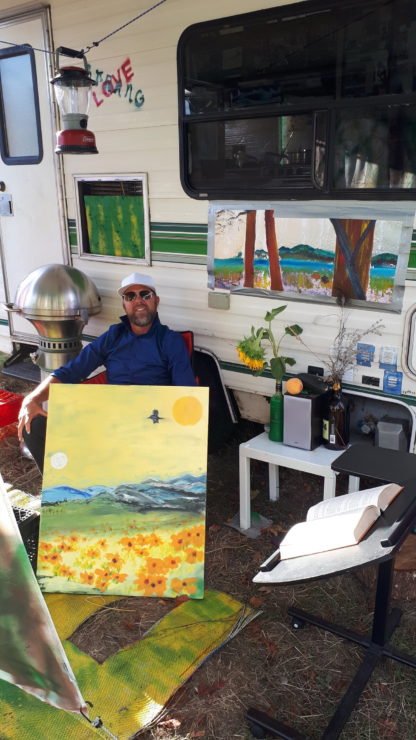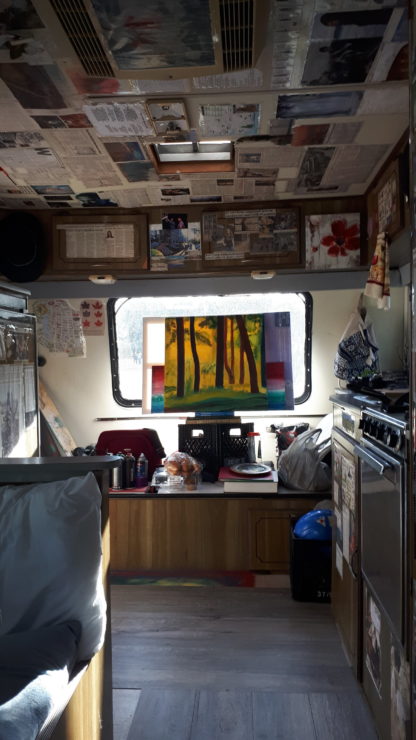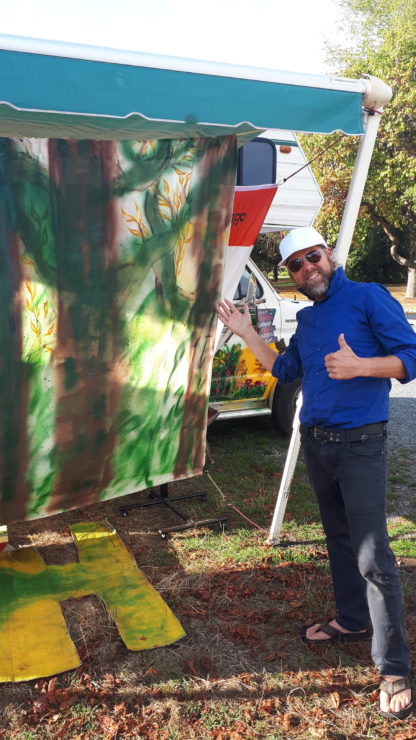Aki’s unique lifestyle provides inspiration to others in following their passion

Walking through the parks and forests of Victoria can feel akin to being in a real-life postcard. One Beacon Hill Park camper is drawing inspiration from his surroundings to depict the beauty of the provincial capital’s largest park and inspire others to see the magic in the nature that surrounds them. Aki is an amateur painter and poet, as well as an aspiring author. He sat down with the Martlet to discuss his work, the beauty of everyday life, and his concerns about materialism and drug addiction.
Aki and I are sitting in his classic RV, which currently rests just a little ways down Circle Drive from Beacon Hill Park’s famous Children’s Farm. The open window beside us filters in the cool, crisp breeze of Autumn and the sound of angry peacocks squawking as park visitors attempt to photograph them.
What has caught my attention is not the sounds of distressed, flightless birds, but rather the eclectic collection of artwork, photographs, and newspaper clippings that are pasted on every wall of the RV. With subjects ranging from environmental degradation to the Canadian fighter Georges St-Pierre, the walls of the RV give me a window into the mind of my companion. Aki explains to me that the clippings provide a cocoon of inspiration that surrounds him while he paints, writes, or recites his latest creative expression.
Aki says that growing up there wasn’t a lot of time for art. Born into a family of well-off Finnish immigrants, Aki says that he was pressured to go into the trades in order to be able to provide the material aspects of life for his wife and kids that forms the backbone of what he calls “materialist” culture.

In his forties, Aki found himself divorced and living in an empty house. He decided it was time for a change.
“I found I was just working a lot to kind of pay for a house, a home, that really lots of times it was just me, I didn’t have the kids full time,” Aki says. “And so as the kids got older, and over time, I just became more of what I call a minimalist.”
Aki sold his house and bought an RV, stopped working full time, and devoted himself to enjoying the simple things in life. Through observing the world around him, he began exploring an artistic side he never knew he possessed.
“I noticed the animals, I noticed what time the sun hits the area that I occupy,” says Aki. “I started noticing the movement of wind, started noticing the seasons, started thinking about even questions like where’s my food come from?”
“What’s important is, to me, it’s the pursuit of waking up every day and willing to kind of be in motion, willing to try,” says Aki.
Aki says that although he started by copying French impressionists, he has since developed his own artistic style which combines the beauty of his natural surroundings with more impressionistic elements. He also says that he doesn’t like the modern trend of perfectionism with its straight lines and crisp depictions, as it doesn’t portray the rough edges that make up the human experience. The recent influx of illustrating software and other digital tools has made creating “perfect” artwork easier than ever.
“I think computers can very easily take art into what’s called decorative art, where the patterns are so there’s symmetry and everything’s kind of perfect,” Aki says. “But it’s not, it doesn’t have that gritty substance of real life, because real life isn’t lived through a machine where there’s a perfect algorithm, actually, the human algorithm is more messy than that.”
Stepping outside, Aki shows me his favourite piece that he has completed so far. It is a coffee table adorned with the sun and the moon which look down over a field of grasses and wildflowers. He calls it “Indian Summer” after the warm autumns that Victoria sometimes experiences. He says that he knows a painting is done when the name comes to him.
Although Aki hopes to one day display his art in a gallery, he is still practicing, learning, and experimenting. He says he has received some snide comments about the quality of his art; however, he also says that he has received a fair number of comments from community members who say that his art has inspired them to pursue their own passions or even begin creating their own art.
“It’s encouraged me,” he says. “And I think that’s the goal, [for] the teacher in me, as long as somebody is trying to develop themselves, kudos for that.”

Besides art, Aki is also working on a novel titled Helvetti (Hellfire in Finnish), a supernatural thriller which explores drug addiction and other contemporary issues. Aki says that he intends the novel to have a moral message, which is that our actions matter.
“As a dad, I watched my four kids go through some of the drug culture, you know, any party in Victoria that has that … any number of drugs [are] available on the table,” he says. “I think we’ve normalized certain behaviors that to me, as a dad, aren’t okay.”
Living in Beacon Hill Park, Aki says that he gets to see on a daily basis the problems that arise when issues like drug addiction are normalized, which he believes are caused by the type of freedoms available in Canadian society.
“In Beacon Hill Park, I see the good and the bad and the ugly of freedom. And some people can’t handle complete freedom. Some people can’t handle a life where there’s no boundaries, where there’s no structure, because they will abuse that freedom,” Aki says. “So the book is trying to for me, as a dad, to understand this culture that’s so free here in Canada.”
The ultimate goal for Aki though is not to get his book published or his art shown at a gallery. Rather, Aki wants to spend every day doing what he loves and spending time with his children.
“What’s important is, to me, it’s the pursuit of waking up every day and willing to kind of be in motion, willing to try,” says Aki. “If I can’t quite pull off a painting or I can’t quite get the words right in a poem or if you like, my novel is stuck, I realize those things are actually not so important.”







